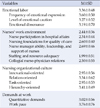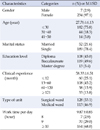Abstract
Purpose
The purpose of this study was to investigate the relationship among work environment of nursing, nursing organizational culture, demands at work and the emotional labor in clinical nurses.
Methods
A convenience sample of 241 registered nurses was obtained from two hospitals. Data were collected by a self-administered questionnaire during December, 2014. Data were analyzed using descriptive statistics, t-test, one-way ANOVA, Pearson correlations and multiple regression with SPSS/WIN 21.0.
Results
The mean score for emotional labor was 3.36±0.48, for work environment of nursing, 2.44±0.36, and for innovational-orientation, 2.95±0.56: Relation-orientation, 3.34±0.62, Task-orientation, 2.95±0.53, and hierarchy-orientation, 3.41±0.49, The score for quantitative demands was 3.02±0.56, and for work pace, 3.76±0.76. In multivariate analysis, factors related to emotional labor were work environment of nursing, innovational-orientation and work pace.
Figures and Tables
Table 2
Emotional Labor, Nurses' Work Environment, Nursing Organizational Culture and Demands at Work of Participants (N=241)

References
1. Yang YK. A study on burnout, emotional labor, and self-efficacy in nurses. J Korean Acad Nurs Adm. 2011; 17(4):423–431.
2. Kim HJ, Kim JH. Emotional labor, social support, and depressive symptoms of clinical nurses in a province, Korea. Korean J Occup Health Nurs. 2011; 20(3):308–318. DOI: 10.5807/kjohn.2011.20.3.308.
3. Morris JA, Feldman DC. The dimensions, antecedents, and consequences of emotional labor. Acad Manage Rev. 1996; 21:986–1010.
4. Arlie Russell Hochschild. Emotion work, feeling ruled, and social
structure. J Sociol. 1979; 85(3):551–575.
5. Kim MH, Lee SH, Song JY, Yu JH, Youn JH. Concept analysis of nurses' emotional labor. Glob Health Nurs. 2014; 4(2):78–87.
6. Park MM, Han SJ. Relations of job satisfaction with emotional labor, job stress, and personal resources in Home Healthcare Nurses. J Korean Acad Community Health Nurs. 2013; 24(1):51–61. DOI: 10.12799/jkachn.2013.24.1.51.
7. Kim KO, Cho YC. The Relationship between emotional labour and depressive symptoms among nurses in university hospital. J Korea Acad Ind Coop Soc. 2013; 14(8):3794–3803. DOI: 10.5762/KAIS.2013.14.8.3794.
8. Byun DS, Yom YH. Factors Affecting the burnout of clinical nurses-Focused on emotional labor. J Korean Acad Nurs Adm. 2009; 15(3):444–454.
9. Kwon MJ, Kim KS, Ahn SY. Effects of emotional labor, nursing organizational culture on self-efficacy in clinical nurses. J Korea Acad Ind Coop Soc. 2014; 15(4):2225–2234. DOI: 10.5762/KAIS.2014.15.4.2225.
10. Shin MK, Kang HL. Effects of emotional labor and occupational stress on somatization in nurses. J Korean Acad Nurs Adm. 2011; 17(2):158–167.
11. Son YJ, Park SK, Kong SS. Impact of internal marketing activity, emotional labor and work-family conflict on turn-over of hospital nurses. J Korean Clin Nurs Res. 2012; 18(3):329–340.
12. Kim MJ. Effects if the hotel employee's emotional labor upon the job-related attitudes. J Tourism Sci. 1998; 21(2):129–132.
13. Cha SK, Shin YS, Kim KY, Lee BY, Ahn SY, Jang HS, et al. The degrees of emotional labor and the its related factors among clinical nurses. J Korean Clin Nurs Res. 2009; 15(2):23–35.
14. Jeon JH. The influence of emotional labor on burnout and job satisfaction among clinical nurses [master's thesis]. Deagu: Kyungpook University;2010.
15. Kim MY. Structural equation modeling on nurses' emotional labor including antecedents and consequences. [master's thesis]. Soeul: Konkuk University;2015.
16. Lake ET, Friese CR. Variations in nursing practice environments: Relation to staffing and hospital characteristics. Nurs Res. 2006; 55:1–9.
17. Cho E, Choi M, Kim EY, Yoo IY, Lee NJ. Construct validity and reliability of the Korean version of the practice environment scale of nursing work index for Korean nurses. J Korean Acad Nurs. 2011; 41(3):325–332. DOI: 10.4040/jkan.2011.41.3.325.
18. Han SJ. A study on the relationship between nursing organizational culture and organizational performance. J Korean Acad Nurs Adm. 2001; 8(3):441–456.
19. June KJ, Choi ES, Park MJ. Effect of psychosocial work environment and self-efficacy on mental health of office workers. Korean J Occup Health Nurs. 2013; 22(3):228–239. DOI: 10.5807/kjohn.2013.22.3.228.
20. Kim SJ. The effects of emotional labor and job stress of employees at an university hospital on job satisfaction [master's thesis]. Jinju: Kyungsang University;2013.
21. Ju EJ, Kwon YC, Nam MH. Influence of clinical Nurses' work environment and emotional labor on Happiness Index. J Korean Acad Nurs Adm. 2015; 21(2):212–222. DOI: 10.11111/jkana.2015.21.2.212.
22. Im SB, Lee MY, Kim SY. Nurses' perception of organizational commitment, nursing work environment, and social support in a general hospital. J Korean Acad Nurs Adm. 2015; 21(1):1–9. DOI: 10.11111/jkana.2015.21.1.1.
23. Kwon JO, Kim EY. Impact of unit-level nurse practice environment on nurse turnover intention in the small and medium sized hospital. J Korean Acad Nurs Adm. 2012; 18(4):414–423. DOI: 10.11111/jkana.2012.18.4.414.
24. Jung AS. A study on the relations between a health promoting behaviors and self-efficacy in general hospital. [master's thesis]. Seoul: Hanyang University;2007.
25. Kwon HJ, Suk BH, Chee SJ, Ahn YM, Kim YJ, Park SA, et al. The relationships between the types of nursing organizational culture, nurses' satisfaction with life, and job satisfaction. J Korean Clin Nurs Res. 2011; 17(1):57–69.
26. Kim IS. The role of self-efficacy and social support in the relationship between emotional labor and burnout, turn over intention among hospital nurses. J Korean Acad Nurs Adm. 2009; 15(4):515–526.
27. Hong SH, Park SM, Lee EK, Lee YJ, Woo YH, Kim HJ, et al. The study of nurses' emotional labor, self-esteem and job attitude. Chung-Ang J Nurs. 2008; 12:41–54.
28. Kim SJ, Oh YA, Lee MS. Job characteristics and job stress level of female emotional labor workers based on occupational categories. Korean Rev Crisis Emerg Manage. 2015; 11(3):231–245.




 PDF
PDF ePub
ePub Citation
Citation Print
Print






 XML Download
XML Download